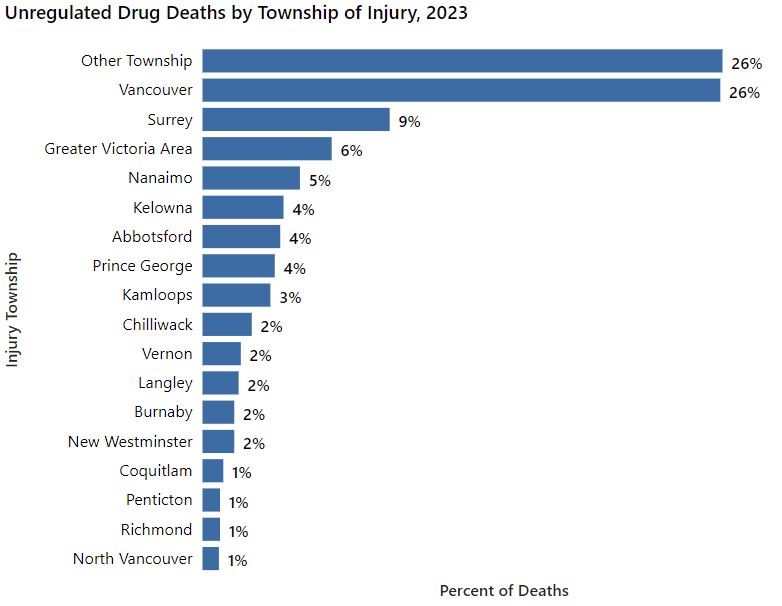New Westminster is already nearing the number of unregulated drug deaths reported in the city in all of 2022 – with three months of reporting remaining for 2023.
The latest report from the BC Coroners Service shows there were 29 illicit drug toxicity deaths in New West between January and September. That’s just three fewer than the 32 deaths reported in all of 2022.
According to the coroners service, New Westminster has accounted for two per cent of all of the unregulated drug deaths in B.C. in the first nine months of 2023.
Here are the number of unregulated drugs deaths in New Westminster for the past decade, as reported by the BC Coroners Service: 2013 — five; 2014 — nine; 2015 — 12; 2016 — 10; 2017 — 24; 2018 — 36; 2019 — 20; 2020 — 36; 2021 — 47; and 2022 — 32.
The BC Coroners Service’s monthly update into unregulated drug deaths in BC showed that 175 lives were lost to toxic drugs in September 2023, which is an average of approximately 5.8 deaths per day. Since the province declared a public health emergency in April 2016, at least 13,112 British Columbians have lost their lives to the crisis.
The coroners services’ update said unregulated drug toxicity is the leading cause of death in British Columbia for persons aged 10 to 59, accounting for more deaths than homicides, suicides, accidents, and natural disease combined.
On the same day that it issued its monthly update into unregulated drug deaths in the province, the BC Coroners Service released a report from its death review panel. That report is calling for expanded access to a safer drug supply.
Convened by the chief coroner in December 2022, the panel included experts in public health, population health, addictions medicine, First Nations health, law enforcement and substance use and harm reduction.
Lisa Lapointe, B.C.’s chief coroner, said the report reflects the panel's recognition of the need for an urgent and dedicated response to a serious and ongoing public health and safety risk.
"While the concept of safer supply may be challenging for some to understand, the expert members of the panel have provided a thoughtful and careful way forward and out of this crisis,” she said in a news release. “It is clear that safer supply is only one piece in a necessary continuum of care for British Columbians at serious risk of death. While that continuum of care is being developed, thousands more of our family members, friends and colleagues are at risk of dying. As the panel found, urgent access to a safe alternative to the current toxic, unregulated and ever-growing illicit drug market is necessary to keep people alive."
The panel’s mandate was to consider previous death review panel recommendations that could be quickly implemented on a scale that could reduce substance-related fatalities in B.C. It affirmed the need for a comprehensive and timely approach to the crisis and recommended, in the short term, the fastest way to reduce deaths is to reduce dependence on the unregulated toxic drug supply.
“This requires creating access to a quality controlled, regulated supply of drugs for people at risk of dying,” said a news release from the BC coroners service.
The panel noted that, while as many as 225,000 British Columbians are estimated to use unregulated substances, fewer than 5,000 per month receive safer supply prescriptions.
The panel's report, An Urgent Response to a Continuing Crisis, provides a framework to operationalize the first recommendation from the previous death review panel report, which was issued in March 2022. That recommendation, to "ensure a safer drug supply to those at risk of dying from the toxic illicit drug supply," advocated for a non-medicalized approach to complement the existing medical model.
The panel’s recommendations include:
- The provincial Ministry of Mental Health and Addictions immediately begin taking steps to apply to the federal Minister of Health and Minister of Mental Health and Addictions for a class exemption to the Controlled Drugs and Substance Act to allow access, without a prescription, to the class of opioid and stimulant drugs, for people at risk of dying due to the toxicity of the drug supply in British Columbia.
- The Ministry of Mental Health and Addictions develop an application for agencies to apply for licensure and delegated authority to distribute the regulated substances on a non-prescription basis.
- The Ministry of Mental Health and Addictions engage with people with lived and living experience with substance use and family/caregivers in the process of planning, implementation and evaluation to ensure the needs of people most at risk of dying from the unregulated drug supply are met.
- The Ministry of Mental Health and Addictions, in conjunction with the Ministry of Health and the Ministry of Indigenous Relations and Reconciliation, and respecting Indigenous self-determination, further fund, support and engage with Indigenous leadership to identify Indigenous solutions to the crisis, potentially including, but not limited to, the actions suggested above.



